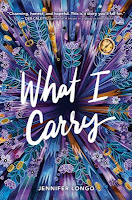Think about that. "How can a human being be illegal?" It baffles my mind that there are currently 65.6 million people worldwide who have been displaced from their homes. 22.5 million of those are refugees. Also included in that number are 10 million stateless people, which means they don't have a country to call home; they are country-less. Over half of the refugees come from three countries: Syria, Afghanistan, and South Sudan. (from UNHCR Figures at a Glance).
Americans, Europeans, Middle Easterners, and others have mixed views on helping refugees. Should refugees be allowed to enter their countries, or should refugees be returned to their homes - the places they were fleeing from in the first place. Before reading Refugee, I agreed with those who said we should take refugees in. After reading Refugee, my belief is even stronger. Those fleeing their countries are desperate; we must take them in.
 Refugee by Alan Gratz
Refugee by Alan GratzThis book is a popular one in our public library system, and I was on the wait list for two months. The book is well worth the wait. To be honest, I think Refugee is one of the most important books of our time, and it is a must-read for middle school students to adults. For those who believe refugees are "illegal" and should be sent back home, this book will open your eyes to the horrors refugees experience in their homelands and then on their journeys. It was an absolutely heart-breaking book. Children and families are risking their lives to live somewhere safe. We need to be accepting of them and help. They are humans and can't be illegal. Warning: Tears might be shed at the end of the novel.
Goodreads Blurb: JOSEF is a Jewish boy living in 1930s Nazi Germany. With the threat of concentration camps looming, he and his family board a ship bound for the other side of the world . . .
ISABEL is a Cuban girl in 1994. With riots and unrest plaguing her country, she and her family set out on a raft, hoping to find safety in America . . .
MAHMOUD is a Syrian boy in 2015. With his homeland torn apart by violence and destruction, he and his family begin a long trek toward Europe . . .
All three kids go on harrowing journeys in search of refuge. All will face unimaginable dangers -- from drownings to bombings to betrayals. But there is always the hope of tomorrow. And although Josef, Isabel, and Mahmoud are separated by continents and decades, their stories will tie together in the end.




No comments:
Post a Comment